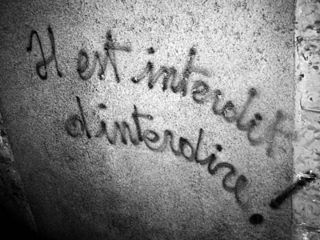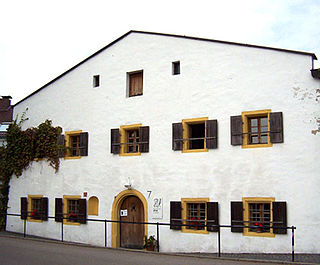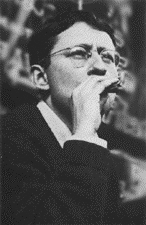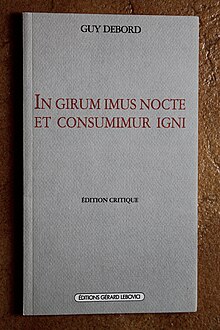
The Situationist International (SI) was an international organization of social revolutionaries made up of avant-garde artists, intellectuals, and political theorists. It was prominent in Europe from its formation in 1957 to its dissolution in 1972. The intellectual foundations of the Situationist International were derived primarily from libertarian Marxism and the avant-garde art movements of the early 20th century, particularly Dada and Surrealism. Overall, situationist theory represented an attempt to synthesize this diverse field of theoretical disciplines into a modern and comprehensive critique of mid-20th century advanced capitalism.

A détournement, meaning "rerouting, hijacking" in French, is a technique developed in the 1950s by the Letterist International, and later adapted by the Situationist International (SI), that was defined in the SI's inaugural 1958 journal as "[t]he integration of present or past artistic productions into a superior construction of a milieu. In this sense there can be no situationist painting or music, but only a situationist use of those means. In a more elementary sense, détournement within the old cultural spheres is a method of propaganda, a method which reveals the wearing out and loss of importance of those spheres."

The Letterist International (LI) was a Paris-based collective of radical artists and cultural theorists between 1952 and 1957. It was created by Guy Debord and Gil J. Wolman rejoined by Jean-Louis Brau and Serge Berna as a schism from Isidore Isou's Lettrist group. The group went on to join others in forming the Situationist International, taking some key techniques and ideas with it.

Psychogeography is the exploration of urban environments that emphasizes interpersonal connections to places and arbitrary routes. It was developed by members of the Letterist International and Situationist International, which were revolutionary groups influenced by Marxist and anarchist theory as well as the attitudes and methods of Dadaists and Surrealists.
Lettrism is a French avant-garde movement, established in Paris in the mid-1940s by Romanian immigrant Isidore Isou. In a body of work totaling hundreds of volumes, Isou and the Lettrists have applied their theories to all areas of art and culture, most notably in poetry, film, painting and political theory. The movement has its theoretical roots in Dada and Surrealism. Isou viewed his fellow countryman Tristan Tzara as the greatest creator and rightful leader of the Dada movement, and dismissed most of the others as plagiarists and falsifiers. Among the Surrealists, André Breton was a significant influence, but Isou was dissatisfied by what he saw as the stagnation and theoretical bankruptcy of the movement as it stood in the 1940s.

Asger Oluf Jorn was a Danish painter, sculptor, ceramic artist, and author. He was a founding member of the avant-garde movement COBRA and the Situationist International. He was born in Vejrum, in the northwest corner of Jutland, Denmark, and baptized Asger Oluf Jørgensen.
André Frankin was a Belgian Lettrist and Situationist.

Raoul Vaneigem is a Belgian writer known for his 1967 book The Revolution of Everyday Life.

The dérive is an unplanned journey through a landscape, usually urban, in which participants stop focusing on their everyday relations to their social environment. Developed by members of the Letterist International, it was first publicly theorized in Guy Debord's "Theory of the Dérive" (1956). Debord defines the dérive as "a mode of experimental behaviour linked to the conditions of urban society: a technique of rapid passage through varied ambiances."

Gruppe SPUR was an artistic collaboration formed by the German painters Heimrad Prem, Helmut Sturm, and Hans-Peter Zimmer, and the sculptor Lothar Fischer in 1957. They published a journal of the same name Spur.

Isidore Isou, born Isidor Goldstein, was a Romanian-born French poet, dramaturge, novelist, film director, economist, and visual artist. He was the founder of Lettrism, an art and literary movement which owed inspiration to Dada and Surrealism.

Unitary urbanism (UU) was the critique of status quo "urbanism", employed by the Letterist International and then further developed by the Situationist International between 1953 and 1960.

La Société du Spectacle is a black-and-white 1974 film by the Situationist Guy Debord, based on his 1967 book of the same name. It was Debord's first feature-length film. It uses found footage and détournement in a radical Marxist critique of mass marketing and its role in the alienation of modern society.

Michèle Bernstein is a French novelist and critic, most often remembered as a member of the Situationist International from its foundation in 1957 until 1967, and as the first wife of its most prominent member, Guy Debord.
Gérard Lebovici was a French film producer, editor and impresario.

Gil Joseph Wolman was a French artist. His work encompassed painting, poetry and film-making. He was a member of Isidore Isou's avant garde Letterist movement in the early 1950s, then becoming a central figure in the Letterist International, the group which would subsequently develop into the Situationist International.

Mémoires (Memories) is an artist's book made by the French social critic Guy Debord in collaboration with the Danish artist Asger Jorn. Its last page mentions that it was printed in 1959, however, it was printed in December 1958. This publication is the second of two collaborative books by Jorn and Debord whilst they were both members of the Situationist International.

Situationist prank is a term used in the mass media to label a distinctive tactic by the Situationist International, consisting of setting up a subversive political prank, hoax or stunt; In the terminology of the Situationist International, stunts and media pranks are very similar to situations. The détournement technique, that is "turning expressions of the capitalist system against itself," was the essential element of a situationist prank. The Situationist tactic of using détournement for subversive pranks is such a distinctive and influential aspect of the Situationist International, that they are sometimes labeled as a group of political pranksters.
Situation is a concept developed by French philosopher Jean-Paul Sartre. It refers to "how ritualized action might be avoided or at least confronted consciously as contrary to the subject's freedom of nihilation". It was first expressed in his 1943 work Being and Nothingness, where he wrote that:
[T]here is freedom only in a situation, and there is a situation only through freedom [...] There can be a free for-itself only as engaged in a resisting world. Outside of this engagement the notions of freedom, of determination, of necessity lose all meaning.

Hurlements en faveur de Sade is a 1952 French avant-garde film directed by Guy Debord. Devoid of any images, the film was an early work of Lettrist cinema.
















